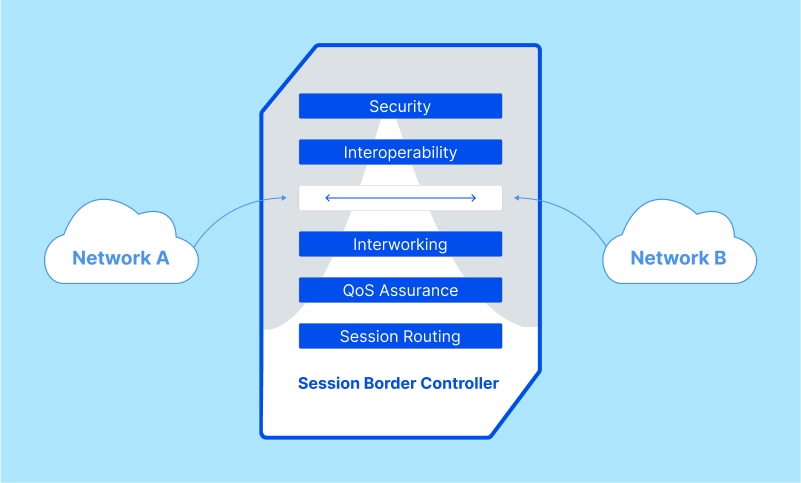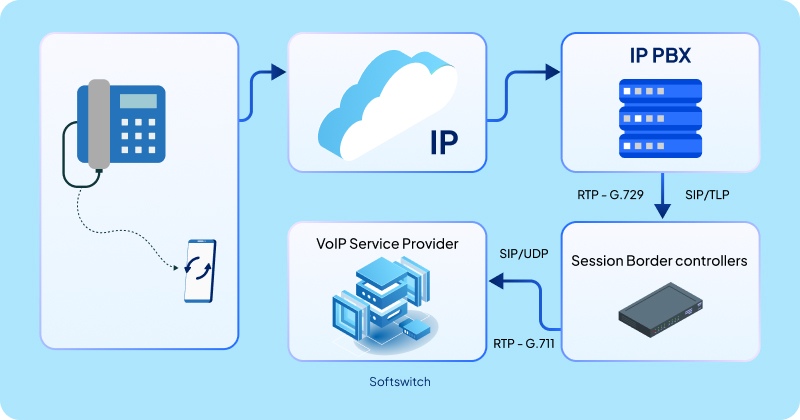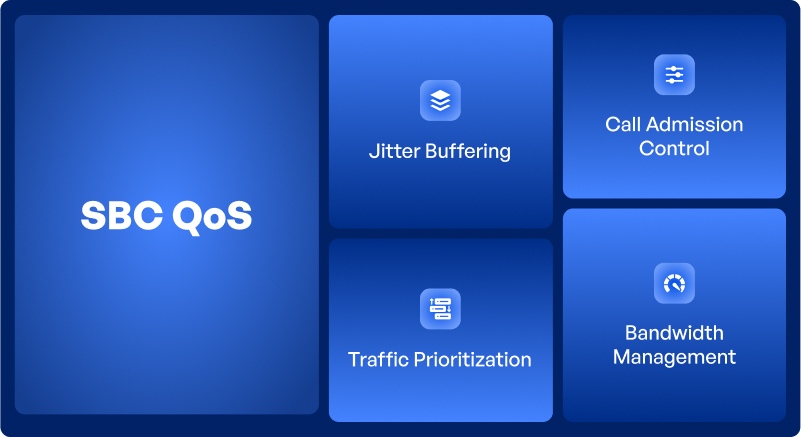
You have a robust firewall installed to secure your business network. But then why do industry experts recommend Session Border Controllers or SBCs to safeguard networks? This is because firewalls are built to guard against traditional threats. Today, businesses have to deal with a wide range of vulnerabilities in VoIP traffic. SBCs offer comprehensive defense to effectively address these unique security challenges.
Clear, seamless, and secure communication is indeed an absolute imperative for any business in today’s interconnected world. Poor call quality and network unreliability can lead to lost opportunities and customer dissatisfaction. It wouldn’t be wrong if I say that these are the challenges that no organization would want to face. And, this is where Session Border Controllers or SBCs play their part, addressing these challenges and emerging as critical components of modern communication infrastructures.
Through this blog, let’s understand the benefits of SBCs, and how they contribute towards building robust and resilient business communication networks. By the end of this post, you’ll have a better understanding of why implementing a Session Border Controller is necessary for your business. So let’s begin!
What is an SBC or Session Border Controller?

An SBC or Session Border Controller is a specialized network device, usually either software or hardware, predominantly used in VoIP or Voice over IP networks to manage and safeguard voice and video calls. SBCs are typically positioned at the edge of a network so that they can monitor, control, and secure the traffic that moves between internal and external networks.
Role of SBC in IP Communications
IP communications have transformed the way businesses communicate. With the transmission of voice, video, and data over an IP network, this technology has enabled a wide range of services such as VoIP, video conferencing, instant messaging, unified communications, etc., which businesses can leverage to enjoy more flexible, cost-effective, and feature-rich communication services.
Let’s get straight to it – why is a Session Border Controller essential for your VoIP or IP communications network? Before I answer this question, let’s first look at some shocking yet valuable statistics:
- 64% of customers expect companies to interact with them without delay during phone calls. (Salesforce)
- Over 60% of customers switch companies due to poor phone-based customer service experiences. (Accenture)
- Network downtime costs businesses an average of $5,600 per minute, equating to over $300,000 per hour. (Gartner)
- A single fraud event can cost a company between $3,000 and $50,000 but can be much higher. For example, a 2009 attack on an Australian company’s VoIP PBX resulted in a bill of over $120,000.
From these figures, it’s easy to envision the serious repercussions businesses face due to poor call quality and network unreliability.
Returning to the question at hand, the answer is quite simple: SBCs contribute to the effectiveness of IP communications in several ways such as providing protection against attacks, performing interoperability, maintain Quality of Service, and offering Network Address Translation (NAT), and Port Address Translation (PAT) services. By deploying an SBC, you can significantly improve the reliability, security, and overall performance of your communication infrastructure.
How Do Session Border Controllers Work?

Before you consider buying or implementing any technology for your business, it is important to understand its functioning. Doing so will help you decide better whether your business needs it or not. When considering an SBC for your networks, first take an in-depth look into its working criteria, which is as follows:
- The Session Initiates
Upon initiation of a VoIP call, the SBC intercepts the SIP signaling traffic. The SIP signaling request is analyzed and it confirms whether the request is from a trusted source. Once confirmed, the connection gets established.
- Authentication and Authorization is Validated
SBCs perform credential checks for users or the devices making the request. With this, it is ensured that only authorized users are allowed to initiate calls.
- Protocols are Normalized
As the calls progress, SBCs perform interoperability or normalization of the protocols and codecs i.e. converting different versions of protocols/ codecs into a standard format for seamless communication.
- Encryption and Decryption is Performed
To secure data in transit, SBCs perform encryption of signaling and media streams. This helps ensure that the call cannot be intercepted through unauthorized access. SBCs can also decrypt incoming packets for inspection, adding a layer of protection against potential threats.
- Bandwidth Allocation and QoS Management is Implemented

As the call proceeds further, SBCs perform traffic prioritization to manage bandwidth. This helps prevent packet loss, delay, jitter, and other issues. SBCs also enforce QoS policies to ensure consistent, high-quality calls even when the network is congested.
- Traffic Monitoring and Fraud Detection in Action
An important function that SBCs perform throughout the call is monitoring the traffic and identifying unusual patterns that may indicate fraud or abuse.
- Managing Session Termination and Call Logging
As the call ends, the SBC clears all the allocated resources and logs the call details for tracking, compliance, and analysis.
Top Advantages of SBCs in VoIP Networks
Session Border Controllers when implemented within a VoIP business network can bring tremendous benefits. Let’s take a look at the key benefits offered by SBCs:
Robust Security
As mentioned at the start of this post, businesses often seek answers to this question – Why do we need an SBC when there’s already a firewall installed? Well, let me answer this for you in more detail. It is true that firewalls and SBCs offer similar roles, they serve distinct purposes, particularly when it comes to VoIP communications.

Firewalls can provide basic security for VoIP traffic. However, when it comes to addressing the specific challenges of SIP traffic, firewalls are simply not sufficient. On the contrary, SBCs are designed to handle VoIP traffic as they mainly focus on scanning SIP-enabled traffic.
Some key functions performed by SBCs that Firewalls lack are:
- Deep Packet Inspection (DPI): SBCs perform DPI to inspect the content of VoIP traffic packets, thus identifying and blocking malicious packets. Firewalls are not designed to perform such detailed analysis.
- Session Management: From initiation to termination, SBCs are involved in the management of the entire lifecycle of a VoIP call. They enforce various policies to efficiently perform session management. On the other hand, firewalls lack such a level of granular control when it comes to VoIP sessions.
- Security Features: SBCs come with a wide range of security features including authentication and authorization, encryption, DoS and DDoS protection, call screening and filtering, etc. On the contrary, firewalls typically offer basic security features and do not offer the same level of protection as SBCs.
- Quality of Service: SBCs ensure optimum call quality at all times even during congested network conditions by enforcing QoS. In contrast, firewalls cannot prioritize certain types of traffic.
Overall, SBCs enforce real-time security methods, and procedures to provide protection, management and quality optimization for VoIP traffic.
Seamless Connectivity
The modern-day networks are complex, comprising diverse devices like phones, printers, and computers. All these are connected to a single business network making management of these devices a critical challenge. This happens because every device may use different communication protocols and configurations, leading to compatibility and connectivity issues.
Moreover, it’s not just about the networks, several businesses also work with multiple service providers for their communication needs. Likewise, each service provider may be using different protocols, adding to the complexity of managing smooth communication.
SBCs help by acting as a centralized management point, sitting on the boundary between your organization’s network and external service providers. From there, it controls and manages the flow of communication between different devices and services by normalizing communication protocols, thus ensuring compatibility and efficiency.
Improved Quality of Service

Without SBCs, businesses relying on VoIP are bound to struggle with poor call quality no matter if it is voice or video. SBCs ensure Quality of Service (QoS) through various functions including:
- Jitter buffering smooths out variations in packet arrival times, resulting in consistent audio and video call quality.
- Call Admission Control or CAC regulates the number of active calls on the network, thus preventing overloading.
- Bandwidth management dynamically allocates resources thus preventing network congestion.
- Traffic prioritization ensures that real-time communication or traffic with high-priority labels receives the necessary bandwidth.
Flexible Network Scaling
Business networks often have fluctuating demands. SBCs employ several strategies to provide these networks with flexible scaling, thus enabling businesses to scale their communication networks up and down based on their current needs, without compromising reliability and quality. Here are some key function of SBCs to support network scaling:

- Load Balancing: SBCs distribute traffic across multiple servers to prevent overload and optimize performance.
- Redundancy: Multiple SBCs are deployed in a redundant configuration to minimize failover.
- Resource Allocation: SBCs can dynamically allocate resources (CPU, memory, etc.) to handle increased traffic loads.
Cost Savings

It’s not just one but several different ways through which session border controllers help businesses save their costs. Let’s take a look:
- SBCs make efficient usage of bandwidth. SBCs prioritize voice and video traffic, ensuring that only necessary data is transmitted. This helps reduce the overall bandwidth requirements leading to lower data costs.
- The interoperability feature of SBCs simply eliminates the need for multiple gateway devices, reducing hardware costs. Additionally, SBCs support cloud-based deployments, which further adds to the savings against on-premise hardware and associated maintenance costs.
- SBCs allow businesses to scale their communication needs without making any significant investments in the infrastructure.
- SBCs perform continuous monitoring and management of the networks, leading to proactive resolution of potential issues. This helps in minimizing downtime and reduces the need for frequent repairs. Ultimately, it lowers maintenance and support costs over time.
Real World Use Cases for Session Border Controllers
In both the enterprise and service provider network landscape, session border controllers play a pivotal role. Let’s delve into these practical scenarios to understand how SBCs are applied in these environments:
-
Role of SBCs in Enterprise Networks
Enterprise networks increasingly rely on VoIP for internal and external communications. With this, the need for secure voice channels becomes essential. SBCs safeguard VoIP traffic from threats like toll fraud, DoS attacks, call tampering, and eavesdropping. By enforcing robust security mechanisms like encryption and authentication, SBCs ensure the security and privacy of data The firewall capabilities of SBCs enable it to block unwanted traffic and prevent unauthorized access to the network.
And there’s more – SBCs also play a critical role in enabling secure remote work and unified communications within enterprise networks. Employees stay connected remotely using VoIP, video conferencing and collaboration tools. SBCs secure voice and video data, handle traffic prioritization, and manage user authentication enabling remote workers to securely and reliably connect with their teams. This helps remote employees to work from anywhere without worrying about unsecured networks.
-
Role of SBCs in Service Provider Networks
Delivering optimum service quality is essential for telecom and internet service providers. SBCs optimize the routing and processing of VoIP calls, ensuring that customers always experience consistent, clear, and uninterrupted interactions, regardless of the network’s load.
Moreover, SBCs protect service providers against fraud and abuse such as toll fraud and call hijacking. For instance, SBCs are capable of identifying and blocking unauthorized call attempts and fraudulent activities including unusual call volumes from specific locations or numbers. It’s of great benefit to service providers as they can prevent financial losses as well as maintain the trust of their customers.
REVE SBC: Fortifying VoIP Security and Performance

With a deeper understanding of SBCs and their benefits, you’re now well-equipped to make a strategic decision about adding one to your network. At REVE, we are committed to empowering our clients with the knowledge they need about the telecommunications sector. We understand the disruptive impact of cyberattacks, which is why we are dedicated to sharing knowledge to help you safeguard your business.
Our REVE Session Border Controller, is an advanced SBC solution that is engineered to offer protection and optimization to your networks. It is a powerful and scalable Class 4 Softswitch platform for communication service providers, that helps make IP wholesale business easily manageable and scalable.
SBC Benefits – Key Takeaway!
Many business organizations have traditional SBC deployments which often don’t meet the needs of modern day networks. If you too are considering the need to upgrade your SBC or go for a new deployment, our experts can help you make the right decision.
Are you ready to take the next step? Schedule a call with our SBC experts today!
Frequently Asked Questions
Why do you need an SBC?
Session Border controllers offer various benefits for VoIP networks. This includes enhanced security, improved call quality, simplified network management, interoperability, and scalability. All these benefits make SBCs essential for VoIP communications.
Can SBCs be used with cloud-based VoIP solutions?
Yes, In fact, SBCs are often integrated into cloud communication services. By using SBCs with cloud-based VoIP solutions, SBCs can provide an additional layer of security, handle interoperability between cloud and on-premises systems as well as optimize call quality. With SBC deployment, enterprises can experience secure, clear, and reliable calls.
What is protocol translation in SBCs?
Protocol translation, or protocol interworking is a crucial function of SBCs which converts different signaling protocols between different devices and networks into a standard format, thus ensuring compatibility. This functionality of SBCs is important because it provides seamless communication even when other protocols are used.
Can SBCs reduce VoIP downtime?
Yes, SBCs can reduce VoIP downtime significantly. Session Border Controllers provide features like load balancing, redundancy, and failover that effectively maintain network availability even during failures or increased traffic. By rerouting calls to an alternative path or distributing the load across multiple servers, SBCs maintain continuous service and minimize service disruptions.
What types of threats can SBCs prevent?
SBCs offer a shield against a wide range of threats including DoS attacks, DDoS attacks, Spoofing, call interception, toll fraud, denial of service, eavesdropping, and Man-in-the-Middle attacks.
Are SBCs only for large enterprises?
No, SBCs are beneficial and valuable for organizations of all sizes. Whether a small company or a large enterprise, they can benefit from the security, quality optimization and interoperability features offered by SBCs. However, large organizations may require advanced features and scalability, smaller ones can benefit from SBCs with basic features.
Can an SBC help with network scalability?
SBCs efficiently help with network scalability by handling increasing traffic volumes and supporting the addition of new users and devices. With features like load balancing, protocol translation, and resource management, SBCs make sure the network can grow and adapt to changing needs.




























